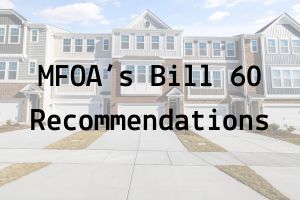MFOA's Positions and Recommendations on Bill 60, Fighting Delays, Building Faster Act, 2025


On October 23, 2025, the Province introduced Bill 60, Fighting Delays, Building Faster Act, 2025. MFOA has written two submissions on Bill 60 to provide commentary on ERO 025-1098, 25-MMAH030, and 25-MMAH018. To read our submissions, please download the pdfs below. For any questions, please reach out to Colin Macdonald (colin@mfoa.on.ca).